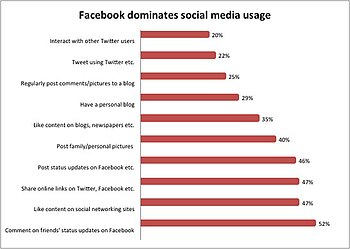| Graph of social media activities (Photo credit: Wikipedia) |
One of the really cool things about working in a university setting, despite some of the nonsense that happens in such settings, is that I get to know some outstanding young adults and engage them in the process of doing science. Over a few meetings with a diverse group of undergraduate and graduate students where I spent more time listening (and believing) than speaking, a fascinating picture of generational difference emerged.
How Social Media Works For Me
For me, there has always been a clear line between the portion of my time I spend online and everything else. I haven't put much conscious effort into maintaining this division; it has just always been there. I do not use any of my personal social media accounts when I am at work, and this includes messing with Twitter or Facebook on my personal phone. When I'm at work, I am there to work and not to screw around. When I am at home, I treat social media as a hobby and nothing more. It is an activity I engage in when I want to, but it is one that rarely intrudes into the rest of my life.
In some ways, using social media has always been a great deal like watching television. When I get tired of it, I log out and do not give it a second thought. When someone says something incredibly stupid, I usually feel the same way I do if I suddenly realize that I've been watching something incredibly stupid on TV. I ask myself why I am doing this, and I chance the channel or turn off the TV. And like watching TV, it does not blur into the rest of my life. When the ball game ends and I turn off the TV, I make a mental transition into whatever real-world activity I am going to do next. The same is true for social media; when the Twitter conversation runs its course, I transition to a real-world activity of some sort.
When I become annoyed, frustrated, bored, or upset by something I encounter on social media, I typically stop using it for awhile. Since it is a rather meaningless way to pass time, it is not worth the experience of emotional distress. But mostly, I don't take what happens on social media any more personally than I would take something I see on TV. Much of what I see on social media seems like little more than a bad reality TV show anyway.
How Social Media Works For Many Young People
Based on what I have heard from several college students and graduate students, almost nothing I've just said about social media is true for them. Many see no dividing line between what happens on social media and what happens offline. For them, it is all one in the same. One student, who enjoys reminding me of my age from time-to-time, explained that social media for them is no different from phone calls for us older people. "If someone you knew called you and said something horrible, it would affect you. This is what social media is for us. Think of it as just another way of communicating." She's right. She was talking about someone one knows offline though, and I think this is an important distinction.
If someone I know in real life made a particularly obnoxious Facebook post, it might affect me. I'd see this as no different from the same person making the same obnoxious comment to my face offline. The online/offline division would not be there in such a case. And yet, if this post was made by someone I didn't know offline, it would have little impact. While this makes perfect sense to me, my younger conversation partners do not see it this way. They have integrated social media into their lives so thoroughly that it does not seem like a hobby, a trivial pass time, or a distraction. It seems every bit as real as a face-to-face conversation.
They struggled to understand explain their point of view to me, and I could tell this was because it was so obvious to them that they couldn't believe I wasn't getting it. I felt the same way. I decided to take another stab at explaining my apparently baffling view of social media.
Most of you are used to using Microsoft Word to write papers, right? And most of you use Word on your laptops, right? So imagine that you are sitting in the library with your laptop open, Word open, and you are writing. You notice that it is almost time for your next class, so you save your paper, close Word, put your computer in your bag, and set off for class. That's how I use social media - just like you use Word. When I am done doing whatever I'm doing in Facebook, I close my browser and move on to the next task.After they finished laughing, they pointed out that most of their social media use takes place on their phones, which are always with them, always on, and set to notify them of anything anybody says anywhere. I have some of that on my phone too, but I've disabled all the notifications and absolutely refuse to install any of that Facebook messaging garbage.
But I think I'm finally beginning to understand the crux of the difference now. For them, social media is never off. It is never something one feels disconnected from. It is ever-present and something to which one is always connected. I think I would have a nervous breakdown within a couple weeks if I tried to operate like that. I'm not sure how (or why) they do it.
